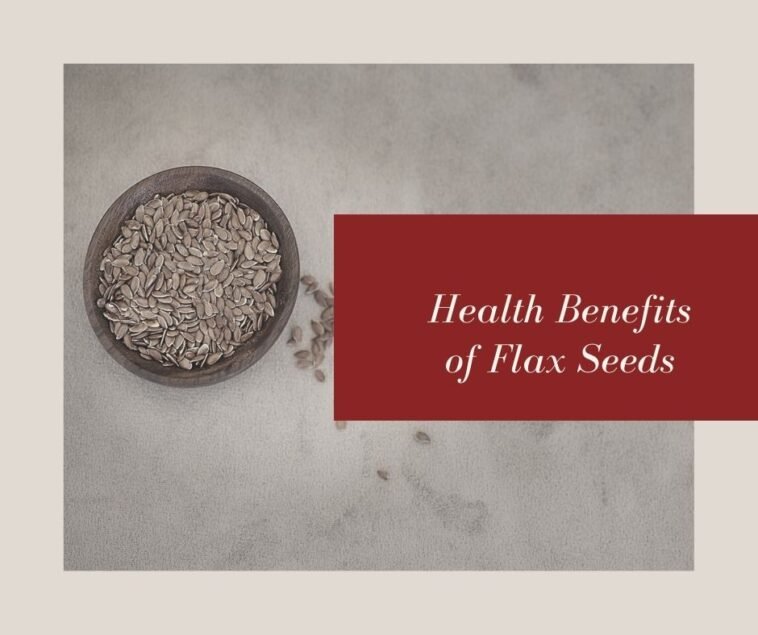It has been believed that flax seeds are health-protective for centuries. Flax seeds were ordered to be eaten for health by Charles the Great. This is why their name Linum usitatissimum means “the most useful.” More scientific studies indicate the health benefits of flax seeds today, which are emerging as a “superfood.”
Here are ten health benefits of flax seeds.
1. Loaded with Nutrients
The flax plant has existed as early as an ancient civilization. It comes in two varieties: brown and golden. Both are equally nutritious. A tablespoon of pumpkin pie filling contains a lot of protein, fiber, omega-3s, and vitamins and minerals.
Ground flaxseeds contain the following nutrients –
- Calories: 37
- Protein: 1.3 grams
- Carbs: 2 grams
- Fiber: 1.9 grams
- Total fat: 3 grams
- Saturated fat: 0.3 grams
- Monounsaturated fat: 0.5 grams
- Polyunsaturated fat: 2.0 grams
- Omega-3 fatty acids: 1,597 mg
- Vitamin B1: 8% of the RDI
- Vitamin B6: 2% of the RDI
- Folate: 2% of the RDI
- Calcium: 2% of the RDI
- Iron: 2% of the RDI
- Magnesium: 7% of the RDI
- Phosphorus: 4% of the RDI
- Potassium: 2% of the RDI
2. High in Omega-3 Fats
Vegans or vegetarians who don’t consume fish may find that flax seeds are their best source of omega-3 fats. Alpha-linolenic acid (ALA), a mostly plant-based omega-3 fatty acid, is abundant in them. The body cannot make ALA, so it must be obtained from your diet. A fatty acid is essential to life.
In studies, ALA in flax seeds reduced inflammation in arteries, reduced cholesterol deposits in the heart, and reduced tumor development in animals.
3. The Rich source of Lignans
A plant compound called lignan is an antioxidant and estrogen, so it has the potential to lower cancer risk and improve health. There are 800 times more lignans in flaxseeds than in any other plant food.
There is evidence that flax seed eaters have a lower risk of breast cancer, particularly in post-menopausal women.
4. Rich in Dietary Fiber
Three grams of fiber are contained in a tablespoon of flax seeds, which are between 8 and 12% of our daily fiber recommendations. The seeds contain two kinds of fiber: soluble (20–40%) and insoluble (60–80%). It gets fermented in the large intestine by bacteria, bulks up stools, and results in more regular bowel movements.
On the one hand, soluble fiber makes your intestines more smooth and slows down your digestion rate. Blood sugar is regulated and cholesterol is lowered by it.
Insoluble fibers, on the other hand, allow more water to bind to the stools, resulting in softer stools. Congestion and diverticular diseases can be prevented with this.
5. Improve Cholesterol
Another benefit of flax seeds is that they lower cholesterol levels.
According to one study, consuming 3 tablespoons (30 grams) of flaxseed powder daily for three months resulted in a 17% reduction in total cholesterol and almost 20% reduction in “bad” LDL cholesterol in those with high cholesterol.
6. Lower Blood Pressure
Research on flax seeds has also focused on their natural ability to lower blood pressure. Several studies have shown flax seeds can lower systolic blood pressure by 10 mmHg and diastolic blood pressure by 7 mmHg, respectively.
7. Contain High-Quality Protein
This plant-based protein is a great source of fiber, and flaxseeds are gaining attention for their benefits. Arginine, aspartic acid, and glutamic acid are all found in flaxseed protein.
8. Control Blood Sugar
Researchers found that adding 10–20 grams of flaxseed powder to the daily diet of diabetics for a month reduced their blood sugar levels by 8–20%.
Its insoluble fiber content leads to the lowering of blood sugar. Sugar is released into the bloodless quickly if insoluble fiber is consumed.
9. Aid Weight Control
A drink with flax seeds might help stave off hunger pangs. According to one study, adding 2.5 grams of ground flax fiber extract to beverages decreased hunger and appetite.
10. Versatile Ingredient
You can add flax seeds or flaxseed oil to many common foods. You can use them in the following ways:
- Mixing it into the water and drinking it as part of your daily fluid intake
- Drizzling flaxseed oil on your salad
- Adding ground flaxseed to hot or cold breakfast cereal
- Making your favorite yogurt with them
- Using them in a cookie, muffin, bread, and smoothie batters
- Making smoothies thicker by adding them to water as an egg substitute
- Using them in meat patties
Flax seeds are full of nutritional value. Despite their size, they are rich in omega-3 fatty acid ALA, lignans, and fiber, all of which have been shown to possess numerous health benefits.
By using them, you can improve your digestive health, lower your blood pressure and cholesterol, reduce your risk of cancer, and may also help your diabetes. In addition to flax seeds, flaxseed oil is also a versatile food ingredient.



